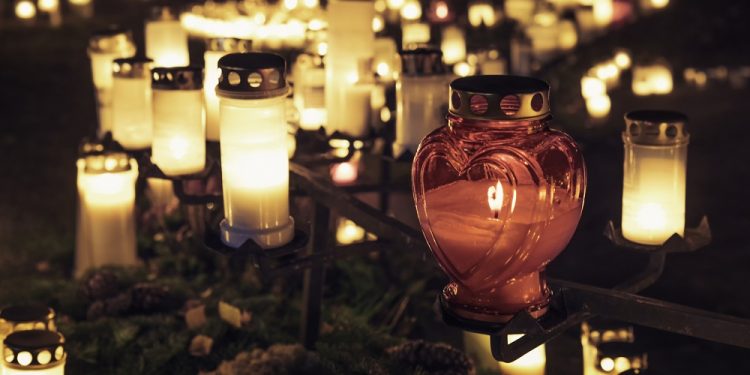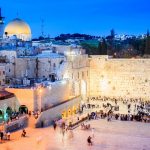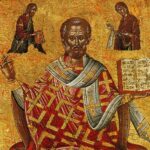
All Souls’ Day
All Souls’ Day is a Christian day set aside to pray for those who have departed from this world. Many religions believe that through prayer, the departed souls will be blessed with eternal life in Heaven. Some religions believe in an intermediary “place” called Purgatory, and through prayers, the departed souls are lifted out of Purgatory into eternal life.
Some religions do not believe in a specific intermediary place but do believe that prayers help the departed souls. What is similar in these various religions is the belief that through prayer for the departed souls, a purifying process to remove sins occurs, and the departed souls are then made ready for eternal life. The first Biblical mention of praying for the deceased began in the book of Maccabees.
History
Before Jesus was born, the first mention in the Bible of praying for those who have departed from this earth occurred in the book called Maccabees. The Maccabees were a Jewish army led by Judas Maccabeus. His leadership of this band of warriors began in 167 B.C. and ended in 161 B.C.
During the battle against the governor of Idumea, Gorgias, some of the Jewish soldiers were slain. When Maccabeus and his army gathered the bodies of these fallen soldiers for burial, “they found under the coats of the slain some of the donaries of the idols of Jamnia, which the law forbids to the Jews: so that all plainly saw that for this cause they were slain.”
Maccabeus gathered together his army and prayed to God that He might forgive the fallen soldiers’ sins. “And because he considered that they who had fallen asleep with godliness had great grace laid up for them. It is, therefore, a holy and wholesome thought to pray for the dead, that they may be loosed from sins.”
After the crucifixion of Jesus, during the early years of Christianity, many different dates were chosen to pray for those who had departed from this world. Some religious sectors chose Pentecost to pray for the departed; other religious sectors chose a day in October for their prayers, and others chose to pray throughout the year.
Some examples for memorializing those who have departed include the following: “In the 6th century, the Benedictine monasteries held a solemn commemoration of deceased members at Whitsuntide, the days following Pentecost.
In Spain, St. Isidore (d. 636) attested to a celebration on the Saturday before Sexagesima Sunday (the second Sunday before Lent, the eighth before Easter in the old calendar). In Germany, Widukind, Abbot of Corvey (d. 980), recorded a special ceremony for the faithful departed on Oct 1.”
During the early 11th century, the first All Souls’ Day was initiated at the Abbey of Cluny. St. Odilo of Cluny proclaimed November 2nd of each year to be the date specifically set aside to pray for those who have departed this world.
“Around 1030, Abbot Odilo set aside November 2 as a day for the special commemoration in his own monastic community for the souls in purgatory. He started this as an observance for the monks of Cluny and all the other communities in the Cluniac family, requiring them, on the day following All Saints, to pray for deceased monks.”
The tradition spread throughout European monasteries and was accepted by many in Western Christianity. For the Roman Catholic religion, the day of November 2nd was not officially approved until the 14th century. Today, throughout the Catholic religion, November 2nd stands as the day to pray for the deceased, the day after All Saints Day of November 1st.
Other Religions
Other religions have kept their practices separate from Western Christianity. The Orthodox religion does not believe in purgatory. “The Greeks teach of one eternal fire alone, understanding that the temporal punishment of sinful souls consists in that they for a time depart into a place of darkness and sorrow, are punished by being deprived of the Divine light, and are purified, that is, liberated from this place of darkness and woe by means of prayers, the Holy Eucharist, and deeds of charity, and not by fire.”
The Orthodox religion practices praying for those who have passed from this world on several different Saturdays throughout the year called “Saturdays for Souls” or “Soul Saturday”.
Within the majority of the Greek Orthodox Churches, the first Saturday of Souls occurs on the Saturday before Meat Fare Sunday; the second Saturday of Souls occurs on the Saturday before the beginning of Lent; the third Saturday of Souls is held on the Saturday before the Sunday of Orthodoxy; and the final Saturday of Souls occurs on the Saturday before Pentecost.
The Church of Jesus Christ of Latter-Day Saints (LDS) practice “Baptism for the Dead,” where “a living person, acting as a proxy, is baptized by immersion on behalf of a deceased person.” Praying “for” the dead as a member of the LDS is not forbidden; however, the members of LDS do not pray “to” the dead.
The members “pray to God the Eternal Father. We believe in His Son, Jesus Christ, and we end our prayers in Jesus’ name. We believe that the Father and the Son are both very much alive.”
The Protestant religion does not believe the place of purgatory exists. The religion is based on the belief that salvation comes from reading scripture and having faith while alive on Earth. “Protestants believe that one’s faith dictates one’s state of salvation and one’s place in the afterlife.”
The Lutheran religion does not believe in any specific intermediary place after death. Lutherans believe that through faith, grace, and scripture, one will have a way to eternal life in heaven. The belief is that after death, the soul remains asleep until the final judgment day. “Luther argued instead that all were sinners, always.
Saints were all Christians whose sins had been forgiven and who had received that forgiveness and had therefore been justified, through faith. At death, they slept peacefully until the final resurrection of the dead when they entered heaven.”
Purgatory
There is a question regarding purgatory and if a place such as this exists in the afterlife. Depending on personal religious beliefs, the answer is yes, there is such a place, or no, purgatory does not exist.
The Roman Catholic religion, for example, believes that after death, most souls destined for Heaven depart into an intermediary “place” for purification from sins. This “place” is called purgatory. The belief is that through prayers, the departed souls in purgatory eventually will have eternal life in Heaven.
During the years after the death of Jesus, many people, saints included, have written on the subject of purgatory and the prayers to assist those who are waiting for the opportunity to be united with God. St. Alfonso Maria de’ Liguori wrote in his memoirs regarding prayers for those in purgatory:
Advantages of this Devotion. The practice of recommending to God the souls in Purgatory, that He may mitigate the great pains which they suffer, and that He may soon bring them to His glory, is most pleasing to the Lord, and most profitable to us.
For these blessed souls are His eternal spouses, and they are most grateful to those who obtain their deliverance from prison, or even a mitigation of their torments. Hence, when they shall enter into heaven, they will certainly not forget those who prayed for them.
Another significant event regarding prayers for those who have died with sins on their heart comes from the visits by the Holy Mother Mary, Our Lady of Fatima, to three young children, Francisco, Jacinta, and Lucia, in the country of Portugal during the year 1917.
Lucia, the oldest of the children, asked Our Lady about two women who had recently passed away. “Lucia asked Our Lady: ‘Is Maria Neves already in Heaven?’ Our Lady answered: ‘Yes, she is.’ Maria was about sixteen years old when she died. Then Lucia asked about Amelia, who had been between the ages of eighteen and twenty. Our Lady’s answer was startling: ‘She will be in purgatory until the end of the world.'”
Conclusion
Depending on one’s religious practices, praying for the departed souls is an important event. Some religions pray throughout the year; some religions pray on certain days of the year. For several religions, especially the Roman Catholic religion, All Souls’ Day of November 2nd is specified as the day to pray for the departed souls; it is a day set aside for remembrance.








